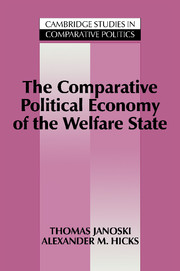Book contents
- Frontmatter
- Contents
- List of contributors
- List of tables and figures
- Preface
- 1 Methodological innovations in comparative political economy: an introduction
- PART I TIME-SERIES ANALYSIS
- 2 Introduction to time-series analysis
- 3 Direct state intervention in the labor market: the explanation of active labor market policy from 1950 to 1988 in social democratic, conservative, and liberal regimes
- 4 Quality of quantity in comparative/historical analysis: temporally changing wage labor regimes in the United States and Sweden
- 5 The politics of public and private investment in Britain
- PART II POOLED TIME-SERIES AND CROSS-SECTIONAL ANALYSIS
- PART III EVENT HISTORY ANALYSIS
- PART IV BOOLEAN ANALYSIS
- Author index
- Subject index
5 - The politics of public and private investment in Britain
Published online by Cambridge University Press: 05 June 2012
- Frontmatter
- Contents
- List of contributors
- List of tables and figures
- Preface
- 1 Methodological innovations in comparative political economy: an introduction
- PART I TIME-SERIES ANALYSIS
- 2 Introduction to time-series analysis
- 3 Direct state intervention in the labor market: the explanation of active labor market policy from 1950 to 1988 in social democratic, conservative, and liberal regimes
- 4 Quality of quantity in comparative/historical analysis: temporally changing wage labor regimes in the United States and Sweden
- 5 The politics of public and private investment in Britain
- PART II POOLED TIME-SERIES AND CROSS-SECTIONAL ANALYSIS
- PART III EVENT HISTORY ANALYSIS
- PART IV BOOLEAN ANALYSIS
- Author index
- Subject index
Summary
Many writers attribute Britain's comparatively poor economic performance and, by implication, the failings of its welfare state to deficiencies in the country's investment mix. Some argue that public investment (particularly in the nationalized industries as opposed to general government capital spending) has been used inappropriately as a tool of economic adjustment, others that it has been unduly inflated, either by pressure from the particular clienteles of those industries (unions seeking jobs or customers seeking subsidized goods) or by managers oriented to quantitative growth of production in the absence of a competitive fiscal constraint. Behind these specific arguments lie two general themes or beliefs about public ownership and investment, beliefs that mirror the larger debate.
On the one hand, John Moore, MP (1986) exemplifies those who believe that the elections lead politicians to interfere in public investment for distributional reasons. He writes that public managers are “constantly at risk from political and bureaucratic interference.… Are the industries businesses or social services?” (p. 83). For those like Moore, political influence in the shadow of electoral competition prevents state managers from undertaking socially preferred investments: inefficiency results from too much popular control. On the other hand, Aharoni (1988) speaks for those who believe that public control allows managers to evade market discipline, while elections provide an inadequate means for voter-consumers to gain satisfaction. He writes that “the many oscillations of government's politics had been a major problem.”
- Type
- Chapter
- Information
- The Comparative Political Economy of the Welfare State , pp. 136 - 166Publisher: Cambridge University PressPrint publication year: 1994
- 2
- Cited by



